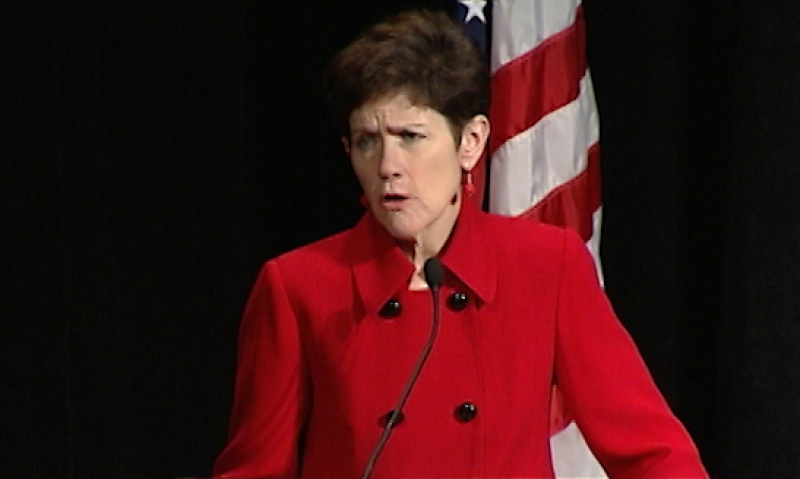
The department’s interim under secretary for health speaks frankly to Legionnaires.
“Your symposium on advancing the care and treatment of veterans with TBI and PTSD, your veterans crisis command centers in areas with the longest waits for appointments – and I pay a lot of attention to what you’re seeing and hearing – and your support for re-authorizing our child-care pilots are just a few examples of that (important) work. So thank you.”
The above quote is from the beginning of Carolyn Clancy’s Aug. 23 remarks to The American Legion’s Veterans Affairs & Rehabilitation Commission at the organization’s 96th annual national convention in Charlotte, N.C. Since July 2, Clancy has been the Department of Veterans Affairs interim under secretary for health; she replaced Robert Petzel, who resigned from office last spring after the Legion called for his removal.
“Your strong support for veterans and for VA, as we improve and restore trust in our health-care system, is deeply appreciated,” Clancy told a large audience of Legionnaires. “To say we have a crisis on our hands would be a pretty big understatement.” VA’s challenge to provide timely health-care access to veterans has been made more difficult by “inappropriate appointment-scheduling practices at many of our facilities,” she said. “So we’re facing a huge crisis of confidence and we have lost the trust of the veterans who depend on us for care.”
It may seem to some, Clancy said, that VA has lost its way but the department has the imperative and opportunity to turn its greatest crisis in a generation into the greatest opportunity for improvement in its history.
VA has taken – and will continue to take – numerous actions to address its systemic access challenges, Clancy said. VA has reached out to more than 240,000 veterans to get them off wait lists and into clinics. Since last May, when former VA Secretary Eric Shinseki resigned from office, the number of veterans on electronic wait-lists has decreased by more than 28,000 veterans.
Clancy said the new VA reform law “created some phenomenal opportunities” for VA, “and we’re very grateful for the additional funding provided by Congress” About $15 billion in new funding will be provided over the next three years: $10 billion to pay for non-VA medical care and $5 billion to hire more VA medical staff. The law also allows VA to lease 27 additional facilities for health care in 18 states and Puerto Rico.
By 2017, because of the reform law’s provisions, Clancy said VA plans to be in a position where it can provide all of its enrolled veterans timely access to high-quality care.
“The mission we have is absolutely unbeatable and sacred to us,” Clancy said. “We know that we’re going to always have some need for non-VA care, but it is not a replacement for a fully integrated health-care system for veterans. The private-sector medical care guaranteed by $10 billion “is kind of a relief valve, while we build our capacity to meet current demand and provide most care within the VA system.”
VA, Clancy said, “missed the signals that our access challenges were systemic and not just in a couple of places; they weren’t isolated. So we know that we can’t -- and I’m here to tell you that we won’t – get complacent and allow that to happen again.” She said that VA Secretary Robert McDonald has directed department facilities to host town hall meetings with local veterans before the end of September, so that their concerns can be heard and addressed.
“We know that we have to earn back veterans’ trust, one veteran at a time,” Clancy said. “We can’t do that unless we’re open and transparent about the scope of our challenges and our progress. That’s why we’re posting data (online) every two weeks.”
- Veterans Healthcare

